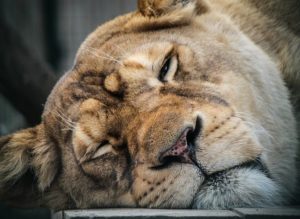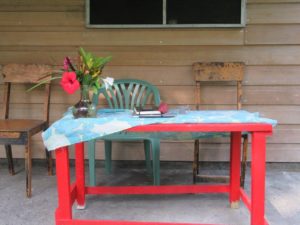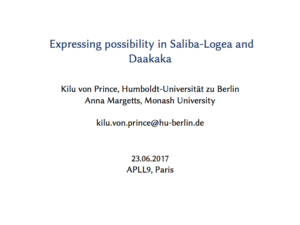The semester ended for me with a highly enjoyable visit at Uta Reinöhl’s lab in sunny Freiburg. I took the opportunity to talk about a puzzle concerning the role and emergence of word units in Oceanic. I’m currently writing a research proposal in the context of a Collaborative Research Centre we’re cooking up at HHU, where I hope to shed more light on this fascinating conundrum.
Tag: Oceanic languages
Out now: Expressing possibility in two Oceanic languages
We can often choose between more basic, highly grammaticalized, ways to express a given meaning, and more verbose ways of doing so. Thus, in English, we may say “Brenda can catch the train” or “it is possible that Brenda will catch the train”, with quite similar interpretations. In my article with Anna Margetts, we argue that expressions of possibility in Daakaka and Saliba-Logea correspond to it is possible that in terms of their syntactic complexity, but to can in terms of their paradigmatic properties, frequencies and meaning. Look at the publication here or download the preprint.
Now out: Dozing eyes and drunken faces
 In many languages of the world, emotions and medical conditions are not attributed to an individual, but to a certain body part. For example, instead of saying “I am sad”, you may have to say something along the lines of “my heart is heavy” in many languages. In these cases, the meaning of “being sad” does not reside in a single word. “Heart” alone does not express sadness, and neither does “heavy”. Only the combination of the two can express this concept. The question is then how such languages form expressions that refer to an abstract emotion such as “sadness” . And the answer is that there are different strategies. One strategy is to say something like “the heaviness of the heart”. The Oceanic language Daakaka, however, uses a different strategy. Here, an emotion concept is expressed by a structure such as “the heavy heart”. This paper investigates these differences and their implications. Get it here or ask me for the preprint.
In many languages of the world, emotions and medical conditions are not attributed to an individual, but to a certain body part. For example, instead of saying “I am sad”, you may have to say something along the lines of “my heart is heavy” in many languages. In these cases, the meaning of “being sad” does not reside in a single word. “Heart” alone does not express sadness, and neither does “heavy”. Only the combination of the two can express this concept. The question is then how such languages form expressions that refer to an abstract emotion such as “sadness” . And the answer is that there are different strategies. One strategy is to say something like “the heaviness of the heart”. The Oceanic language Daakaka, however, uses a different strategy. Here, an emotion concept is expressed by a structure such as “the heavy heart”. This paper investigates these differences and their implications. Get it here or ask me for the preprint.
Three deaths and one marriage…
 …made for a challenging field trip to Ambrym this year. Still, I was lucky enough to get enough speakers both of Daakaka and Dalkalaen to collect the data we need for MelaTAMP – thanks to the people of Emyotungan and Tio Bang in Port Vila. Now I’m excited to start with the analysis. Stay tuned.
…made for a challenging field trip to Ambrym this year. Still, I was lucky enough to get enough speakers both of Daakaka and Dalkalaen to collect the data we need for MelaTAMP – thanks to the people of Emyotungan and Tio Bang in Port Vila. Now I’m excited to start with the analysis. Stay tuned.
MelaTAMP Workshop in Port Vila
We held a small workshop at the University of the South Pacific yesterday, on Emalus Campus in Port Vila, Vanuatu. The purpose was to introduce and discuss the storyboards we have developed as part of the MelaTAMP project.
We thank Robert Early and Meriani Situ for their organisation and local support, and we’re happy that our audience extended far beyond our few project members and collaborators.
APLL in Paris
Tagging tense and modality in Oceanic
 I just came back from an inspiring and informative trip to Saarbrücken. I gave a talk in the FEAST series about tagging tense, aspect, modality and polarity in Oceanic languages. Here are my slides for the talk.
I just came back from an inspiring and informative trip to Saarbrücken. I gave a talk in the FEAST series about tagging tense, aspect, modality and polarity in Oceanic languages. Here are my slides for the talk.
The future is what the universe wants
There was a remarkable small workshop on imperatives at ZAS last week that I was happy to be part of. It was a welcome opportunity to take up my work on potential mood directives in Daakaka and their relations to future assertions and embedded clauses. You can see my slides here.
Out now: Indefinites in Daakaka (Vanuatu)
There are two indefinite articles in the Oceanic language Daakaka, TUSWA and SWA. Like weak NPIs or unspecific indefinites in many other languages, TUSWA is excluded from positive assertions about the episodic past or present. In this paper, I try to locate them within the cross-linguistic space of indefinites and NPIs and sketch out an approach to account for their differences.
Read the full paper here.

